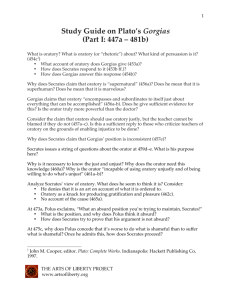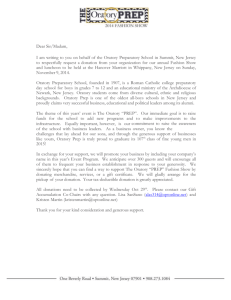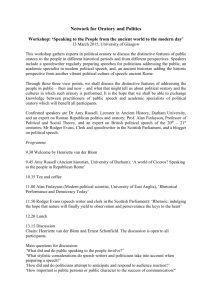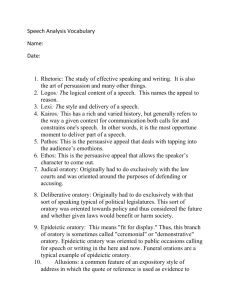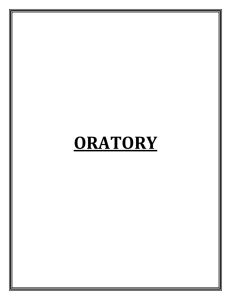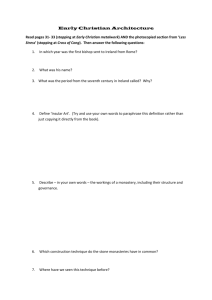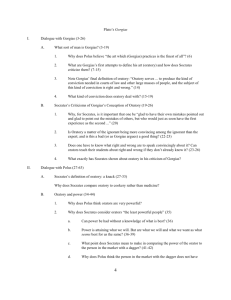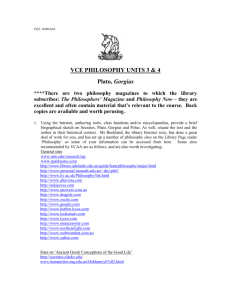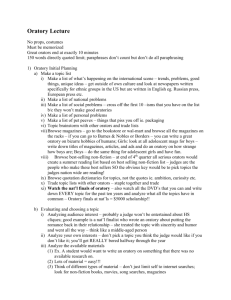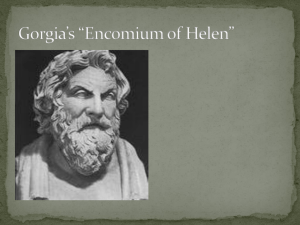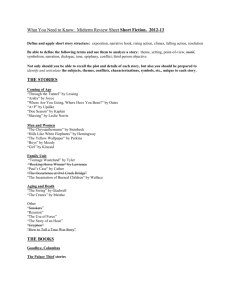BODY
advertisement
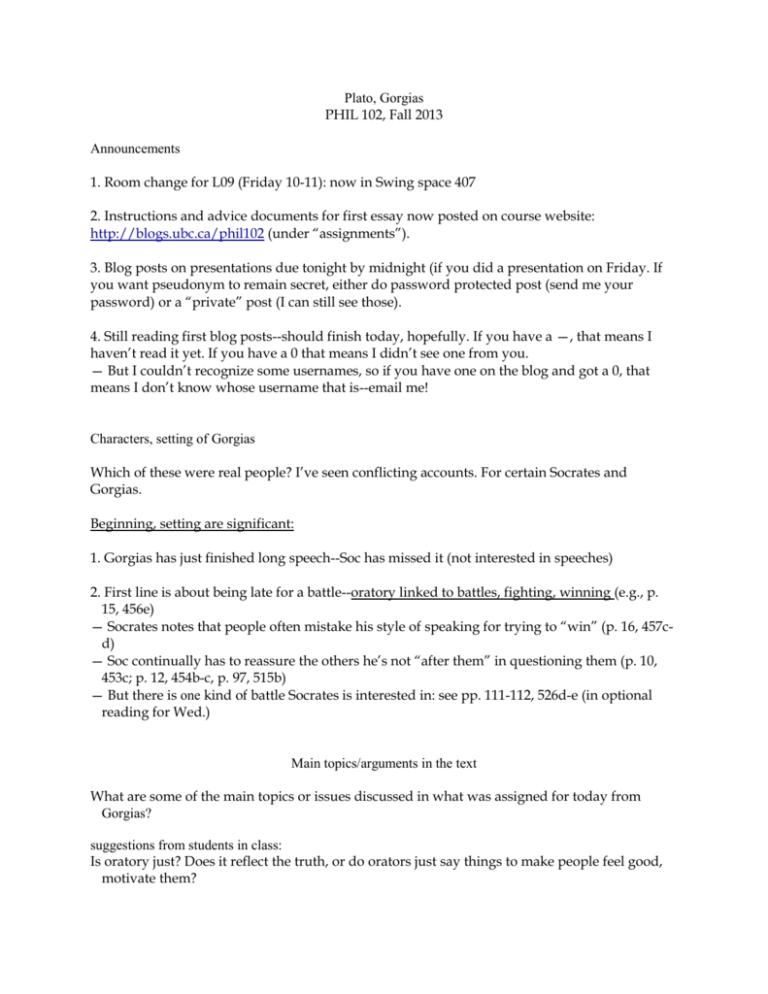
Plato, Gorgias PHIL 102, Fall 2013 Announcements 1. Room change for L09 (Friday 10-11): now in Swing space 407 2. Instructions and advice documents for first essay now posted on course website: http://blogs.ubc.ca/phil102 (under “assignments”). 3. Blog posts on presentations due tonight by midnight (if you did a presentation on Friday. If you want pseudonym to remain secret, either do password protected post (send me your password) or a “private” post (I can still see those). 4. Still reading first blog posts--should finish today, hopefully. If you have a —, that means I haven’t read it yet. If you have a 0 that means I didn’t see one from you. — But I couldn’t recognize some usernames, so if you have one on the blog and got a 0, that means I don’t know whose username that is--email me! Characters, setting of Gorgias Which of these were real people? I’ve seen conflicting accounts. For certain Socrates and Gorgias. Beginning, setting are significant: 1. Gorgias has just finished long speech--Soc has missed it (not interested in speeches) 2. First line is about being late for a battle--oratory linked to battles, fighting, winning (e.g., p. 15, 456e) — Socrates notes that people often mistake his style of speaking for trying to “win” (p. 16, 457cd) — Soc continually has to reassure the others he’s not “after them” in questioning them (p. 10, 453c; p. 12, 454b-c, p. 97, 515b) — But there is one kind of battle Socrates is interested in: see pp. 111-112, 526d-e (in optional reading for Wed.) Main topics/arguments in the text What are some of the main topics or issues discussed in what was assigned for today from Gorgias? suggestions from students in class: Is oratory just? Does it reflect the truth, or do orators just say things to make people feel good, motivate them? Is it worse to do injustice or suffer injustice, and if the former, to be punished or not? Christina’s thoughts on main topics in this section of the text 1. What is oratory and what value does it have? What does it do for listeners? (pp. 2-26, 447d466a) 2. What is the best kind of life to live? Is it worse to be unjust or to suffer injustice from others? (pp. 37-42, 472e-475e) What is oratory and what value does it have? 1. Making (long) speeches (p. 4, 448d; p. 5, 449b) for the purpose of persuasion (p. 10, 453a) — as opposed to Socrates’ Q&A style of discussion (p. 5, 449b) 2. Gorgias: “... the ability to persuade by speeches judges in a law court, councillors in a council meeting, and assemblymen in an assembly or in any other political gathering that might take place” (p. 9, 452e). 3. Gorgias: “...it’s concerned with those matters that are just and unjust” (p. 11, 454b) Notice that Gorgias and Polus can’t easily answer Socrates’ questions about oratory at first--why this is important will be clear later — they both praise oratory in a formal way w/o explaining well what it is, early on (p. 3, 448c; p. 8-9, 451d-452e) 4. Socrates: two types of persuasion: “conviction-persuasion” and “teaching-persuasion” (12-13, 454e-455a) — oratory is like the former (p. 13, 455a) Socrates: “Oratory doesn’t need to have any knowledge of the state of their subject matters; it only needs to have discovered a persuasion device in order to make itself appear to those who don’t have knowledge that it knows more than those who actually do have it” (p. 18, 459c) 5. Oratory as a part of flattery a. oratory is not a “craft,” but part of flattery as a “knack” — oratory is a knack “for producing gratification and pleasure” (p. 23, 462e) — crafts: practices that aim at what is truly good for people, and that can give a rational account for why those things are good and how to achieve them (p. 2, note 4; p. 77-7, 500b501c) — knacks: practices that aim at producing pleasure only, not necessarily what’s good; can’t give a rational account of how they do it; they just guess (p. 78, 501a-b) — flattery is like this (p. 25, 464c-d) b. what part of flattery is oratory? (p. 24-26, 464b-465e) SOUL crafts BODY flattery crafts flattery legislation sophistry gymnastics cosmetics justice oratory medicine pastry baking What is the best way to live? Is it worse to do or suffer injustice? discuss next time...
